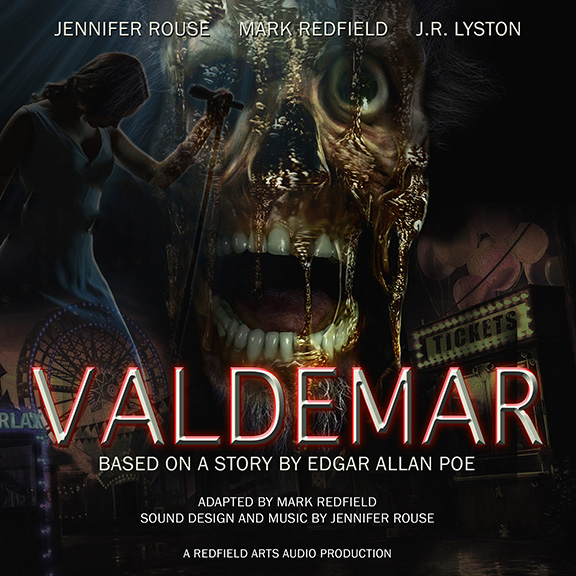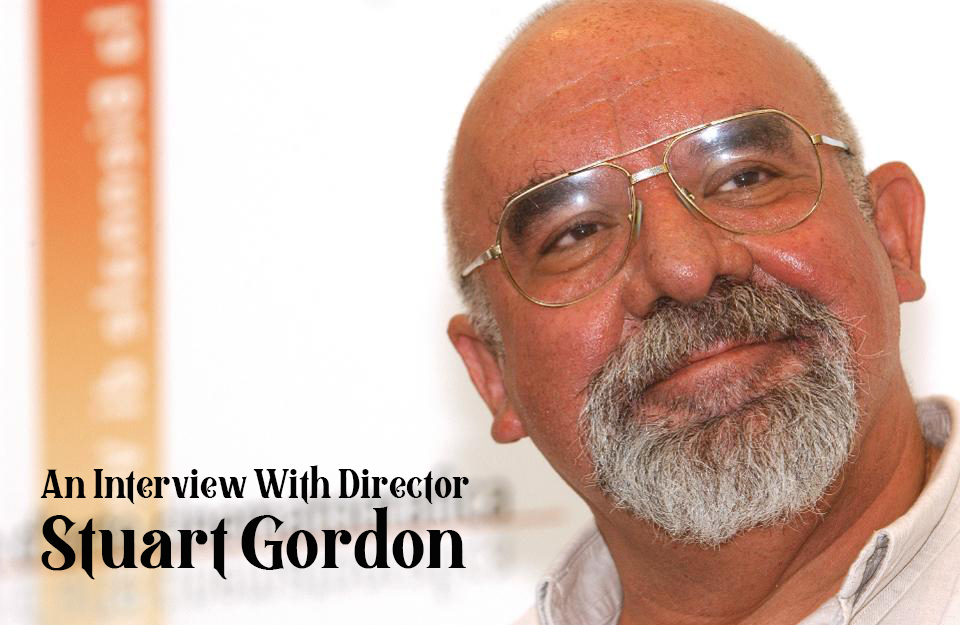Our Latest Releases


Posted 10/22/20

By Mark Redfield
Stuart Gordon (August 11, 1947 – March 24, 2020) began his creative life in the Chicago theatre world. He founded The Organic Theatre in 1969. There, he and his company created electrifying theatre, and produced some of David Mamet’s earliest plays. Moving to Los Angeles to pursue filmmaking, Gordon’s debut film “Re-Animator” (1985) has become a favorite with movie-goers around the world. He met and cast Jeffrey Combs in “Re-Animator”, the beginning of a life-long collaboration between the two. The screenplay was by Dennis Paoli, a dear friend from Gordon’s theatre days in the 1960s. Stuart Gordon would make films with Combs and Paoli for the rest of his life. Highlights in Stuart Gordon’s film career as a director include “Dagon”, “From Beyond”, “King of The Ants”, and David Mamet’s “Edmond”. Screenplays include “Honey, I Shrunk the Kids”. When given the opportunity to adapt a Poe story to Showtime’s series “Masters of Horror”, Gordon chose to adapt Edgar Allan Poe’s “The Black Cat”. He gathered his long-time screenwriting partner Dennis Paoli, and actor Jeffrey Combs to play Poe. While in production, Combs and Gordon began talking about Combs doing a Poe one man show. The result, after a period of research and rehearsal, resulted in the acclaimed “Nevermore, An Evening with Edgar Allan Poe”, premiering at the Steve Allen Theatre in Los Angeles in 2009. Stuart Gordon passed away on March 24th, 2020. His films live on. This audio book production is dedicated to his memory. Without Stuart Gordon, there would be no “Nevermore, An Evening with Edgar Allan Poe”.
This conversation between Stuart and Mark Redfield took place in 2014.
MARK REDFIELD: Is it true that while you were making the Master’s of Horror episode “The Black Cat”, that you suggested then and there on-set that Jeffrey Combs should do a one-man show on Poe?
STUART GORDON: Yeah—‘cause I really started to feel like I was in the room with Poe. He was so believable. He wasn’t Jeffrey anymore. He was somebody else. And that somebody else I started to believe was Edgar Allan Poe.
MARK: How did the Masters of Horror project come to you?
STUART: It was actually inspired by my daughter. She teaches a course in English, and every year I come in around Halloween and talk to the class about Poe. I talk about his life and, one year that I came in, I read “The Black Cat” to the class. And it was absolutely terrifying. I had forgotten how strong that story was. And also, I realized that’s it’s never really been done on film…been done on film and television a million times, but they’ve never done it the way Poe wrote it.
So, I thought: wouldn’t it be cool to really do a faithful adaptation of the story? and then it struck me that you could make Poe the protagonist of the story, because the character sounds a lot like Poe. A guy who is very nice and loves his family and wife, but when he has too much to drink, he turns into another guy—he gets, you know, nasty—and he hurts people that he loves and (in the story) ultimately ends up killing his wife. It seemed like there was a lot of connections with this character and Poe. Poe’s drinking wasn’t all that secret…
|
MARK: I think that it’s true that through-out his life and career—employers and friends, family, they admonished him, begged him, goaded him, tried to trick him—did everything they could to help him stop drinking. Today, some Poe fans, they sort of overlook the drinking. They white-wash it, pretend it wasn’t as serious as it was, and strangely become enablers decades after he’s dead…
STUART: Yeah, yeah—they’re always saying, “…he only needed one glass of wine to get drunk…”, you know, but the fact is that he definitely had a drinking problem.
MARK: His older brother Henry and his father were alcoholics…
STUART: Another thing about “The Black Cat” is that it has—he (Poe) gets into his, what he calls “the Imp of the Perverse”, which, I think, very much defines Poe as a person. You know, it’s the idea that just when everything is going really well, you have to screw it all up. And Poe did just that, over and over again in his life.
So, the idea of it came together very quickly and Jeffrey had been talking to me about wanting to play Poe. He’s been doing a lot of reading about Poe. One of the things he’d realized was that physically he’s very much like Poe. He’s about the same size Poe was. Even has the same color eyes. Everything just sort of came together. And we had the opportunity with Masters of Horror to do an hour-long show. And we could do anything we wanted. In other words, no censorship of any sort. So we could do the show the way he (Poe) wrote it, which is so disturbing, because it involves a great deal of animal cruelty, which I think is hard for an audience to watch.
MARK: How quickly from “The Black Cat” episode in 2006, wrapping that up, to the “Nevermore” production?
|
STUART: I want to say it was a year or two later. It was right around, or before, Poe’s bicentennial anniversary, which I think was in…
MARK: 2009.
STUART: 2009. Right. And that was when—that year—we thought this would be a great thing to do for his bicentennial. And so we started working on it. Dennis Paoli who wrote the script for “The Black Cat” got involved in shaping it into what became “Nevermore”.
MARK: When you started working with Jeffrey on the one-man show—how did you approach it? Had you ever directed a one-person show before?
STUART: No. I had never done a one-man show. One of the things I thought was interesting about this one, was—it really doesn’t feel like a one-man show because, you know, you have these other characters that are unseen. There’s Sarah Helen Whitman in the audience, who he (Poe) does a lot of the show for her…and we decided to set it in the period when he was courting her, and promised her that he would stop drinking. They were planning on getting married, and so the idea that she’s in the audience—it changes it. It kind of changes it from a typical “one-man show’ where they’re usually like “and then I wrote this, and then I wrote that”, and so on.
The idea that Poe would be drinking was something that came up fairly early on. That he would end up kind of wrecking the show…
MARK: What I like about the show is that is isn’t that easy way-out you often see in a one-person show. The engine that drives the show is the idea that you, as the audience, have come to hear Poe recite, or lecture, as he did in the 1840s, and that within that conceit, there’s this great arc, progression, where he’s sober—not sober—then sober. It really allows for the dramatization of different aspects of his persona. It’s a nice theatrical device. He never really got drunk in front of an audience that we know of, but the device reveals things about him dramatically--
STUART: Yeah, yeah, yeah
MARK: It creates, in the end, a wonderful portrait on Poe at that time in his life, toward the end…It fools the audience into a richer understanding of Poe that you couldn’t get if it were a conventional “biographical” one-man show.
STUART: Yeah, yeah. Exactly.
MARK: How much of the script was developed in rehearsal and how much did Dennis Paoli send you guys and say, “Here. Try this on for size"?
STUART: When we first started, the very first things that we did was -- Jeffrey would read the poems and stories that he really wanted to do. And Jeffrey learning them, and kind of working through them. That was the beginning of it all. Several months. It’s a long process. It took about six months. Jeffrey and I talked about Sarah Helen Whitman and we knew that she was going to be involved. We also looked up, as much as we could find, about his---these recitations, recitals, that he did, and the idea of the candle was inspired by one of the things we read where he would often-times do his recitals of poetry or what-have-you lit only by a single candle. And that, I thought, was great, because ---imagine what that was like! With the throwing of shadows on the walls and so forth. From that one source of light! That was incorporated very early on.
And we were working through it all, and we started talking to Dennis about how it would play. Dennis ended up writing it out—he teaches Gothic Literature and he is an expert on Poe—and he went out and found almost 90% of the material in the show. Things Poe actually said. Dennis was able to piece it all together.
MARK: Once you got the rhythm working—and incorporated poems and stories like “The Tell-Tale Heart”, and you have Dennis’s script which is providing structure for you and Jeffrey to work from and play with, what was the rehearsal like? What’s the regimen?
STUART: You know, it was a tremendous amount of material for Jeffrey to memorize. It started with learning the poems, at first, the stories…then the “connective tissue” that Dennis gave…and we worked it through. As I said it’s a long process. I think it took six months.
Towards the end we were able to get the costume from “The Black Cat”. Mick Garris, who was one of the producers on Masters of Horror, helped with that and we got the costume and then Jeffrey knew some make-up guys who built the wig for him and we also got the nose. The nose that was used on “the Black Cat”—the molds for the (prosthetic) nose. And there was a question initially if we would use that (the nose), because it would involve having a make-up artist there every night. And we did a couple of performances, dress rehearsals, where he did not wear the nose, and you know it worked very well, and there was the question whether we should go further with it and finally decided we would, because, when he’s in that make-up—he looks exactly like Poe.
I felt like he—Poe—was just walking out onto that stage. Amazing for an audience.
MARK: I wonder—and this is a question I’ll throw to Jeffrey—if Jeffrey is an actor who is “freed” by the mask, instead of inhibited by it? Curious about Jeffrey’s choice of slight southern accent…when did that choice come along?
STUART: I think that was actually—the accent was from “The Black Cat”. You know, he had done a lot of research about Poe and knew that he was raised in Virginia. That was something that he had all the way through (the accent).
MARK: Jumping back to the early theater days in your career, had you done any Poe adaptations for the stage back in the Organic Theatre days?
STUART: I did. We did a play called “Poe”, which was about Poe’s death. And it was him—we sort of go into the mind of Poe as he’s passing out on the street. And it’s a mixture of his life and his stories. And it was very successful and we ended up doing it twice. The play is still being produced.
|
MARK: Want to “jump cut” right to “Re-Animator: The Musical” now?
STUART: (laughs) Sure. Well, I’ve come from the theater. My background is fifteen years of theater before I ever made a movie, so theater is my first love and I always go back to it, and you know, doing “Re-Animator” as a musical was something that was suggested to me fairly soon after the movie came out. I kind of laughed at it and didn’t think it was possible, but the more I thought about it, the more I thought that it (the story) was really very contained and there’s only a handful of characters—why not? Why can’t it be a musical? And I met this wonderful composer, Mark Nutter, and his sensibility I thought, was perfect for---
I saw a show he did called “The Bicycle Men” and he’s got a terrific sense of humor and his music reminded me a lot of Tom Lehrer—you know his work?
MARK: Oh, yeah. “Poisoning Pigeons in the Park”…
STUART: Yeah! Exactly! He does these cheerful, twisted little songs, and that’s kind of what Mark is into, and is ideal for “Re-Animator”.
MARK: I saw the show in New York, in a nice little theater, unit set. The show was incredibly theatrical. Very physical. Very funny and very tight. The cast was firing on all cylinders. I remember seeing the film “Re-Animator” in the cinema in 1985—little did I think at the time that I’d see a live musical version twenty-seven-years later!
STUART LAUGHS
MARK: So—you’re at the moment when you realize that it’s real—you’re going to make a musical out of your film…how does that process go? What did you do?
STUART: Well, we worked on adapting it for about two years. It took a long time. One of the things that was interesting was, it was done using the script from the film—and Mark Nutter started making a lot of scenes into pure music---it really turned into, well, I think it’s closer to an operetta than a musical, actually.
MARK: True.
STUART: There’s a lot—I think 90% of it that is singing. Very little is just spoken word. So Mark’s able to turn those scenes into songs. It was great. Far more music that I ever imagined. I remember sitting down and putting a list together where I thought songs could go, and he did that plus three times as many songs as I imagined!
MARK: When you mounted the first production in Los Angeles, did you have a development/workshop period, or did you go right from page to stage?
STUART: We actually did several readings of it, before we mounted it on stage. And we did make changes as we were going along. And it’s still going through changes with this newest incarnation in 2014. It’s got several new songs and if you see it again it’ll be different from the one you saw in New York.
-------------------------
“This is Poe in his own words. Our text is taken from his letters and essays and we have based our evening on reviews and reports of his actual appearances. Our goal is to present a sense of the fascinating man behind the poetry and brilliant tales, a man who could be his own worst enemy, and whose life was even more bizarre and tragic than his strangest story.”
- Stuart Gordon, October 2014
Redfield Arts Audio Presents “Nevermore, An Evening with Edgar Allan Poe”. Starring Jeffrey Combs. Written by Dennis Paoli. Directed by Stuart Gordon. Produced for audio by Mark Redfield. Incidental Music by Natalie Combs. Sound Design by Jennifer Rouse. Cover Photo by Ward Boult.
Running Time: approximately 90 minutes
Distributed by Oasis Audio
Produced by Redfield Arts Audio
Copyright 2020 The Mark Redfield Company
On Audible
US
https://www.audible.com/pd/Nevermore-Audiobook/1645553361
UK
https://www.audible.co.uk/pd/Nevermore-Audiobook/1645553361
Canada
https://www.audible.ca/pd/Nevermore-Audiobook/1645553361
Australia
https://www.audible.com.au/pd/Nevermore-Audiobook/1645553361
India
https://www.audible.in/pd/Nevermore-Audiobook/1645553361
Other great platforms
Kobo
https://www.kobo.com/us/en/audiobook/nevermore-an-evening-with-edgar-allan-poe